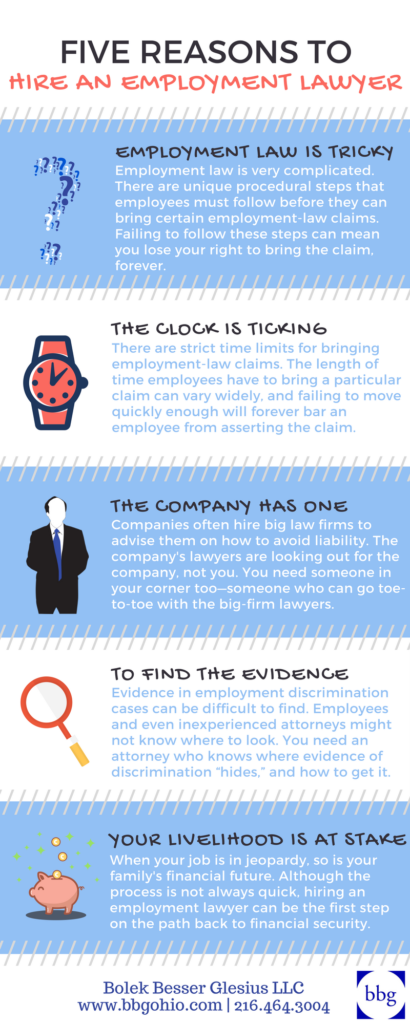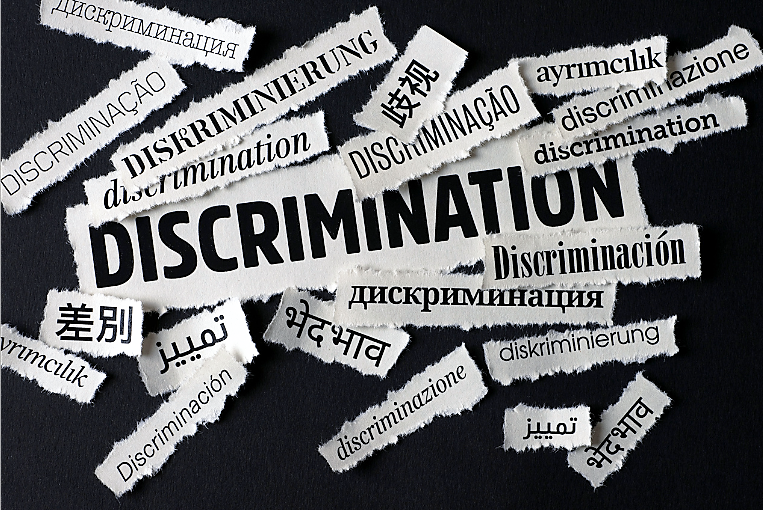Cleveland Employment Discrimination Attorney
If you are being discriminated against, harassed, or otherwise mistreated at work, you are probably going through an extremely difficult time. Maybe you dread going into work every day. Maybe you’re worried about supporting yourself and your family. You aren’t alone. And you don’t have to tolerate employment discrimination. Call an employment discrimination lawyer at Bolek Besser Glesius today.
Both Ohio and federal law prohibit employment discrimination based on race, color, religion, sex, gender, national origin, age, disability, and pregnancy. Federal law also prohibits employment discrimination on the basis of sexual orientation. Employers may not discriminate in any aspect of employment based on any of these protected characteristics. That means employers may not consider them when making decisions about hiring, firing, pay, job assignments, promotions, demotions, layoff, training, fringe benefits, or any other terms or conditions of employment.
What Is Evidence of Employment Discrimination in Ohio?

Proving discrimination in the workplace can be difficult. But there are several common telltale signs, including:
- Discriminatory statements by decision-makers or supervisors. Slurs, offensive jokes, or other biased comments about an employee’s age, race, sex, or other protected characteristic are often strong evidence of employment discrimination. Sometimes these statements come in the form of “code words” —for example, asking an older worker about retirement. The significance of these sorts of comments depends on their seriousness and how closely they relate to the adverse action the employer takes against the employee.
- Treatment of similarly situated employees. In many cases, evidence of discrimination is found in more favorable treatment of employees outside the plaintiff’s protected group under similar circumstances. For example, evidence that an employer fired a woman for allegedly engaging in misconduct but did not fire a man for doing the same thing could signal that the employer’s true motivation for firing the female employee was her sex.
- Departure from workplace policies. An employer’s failure to follow its own relevant personnel policy in making an employment decision may be evidence that the decision was based on an impermissible bias.
- Discrimination against others. Evidence that the employer has discriminated against other employees in the same protected group can help demonstrate discrimination against the plaintiff. Whether this evidence will be considered by a court depends on the particular circumstances.
Evidence of discrimination is certainly not limited to these situations, but they are common indicators that discrimination might have occurred. Employees who believe they might have been the victim of illegal treatment in the workplace should speak to an experienced Cleveland employment discrimination attorney to determine whether they may have a claim.
Ohio Workplace Discrimination Lawyer for Hostile Work Environments
Discrimination can take other forms besides just hiring and firing. Harassing employees on the basis of their race, sex, age, disability, or other protected characteristic is also employment discrimination.
Unlawful harassment occurs when unwelcome conduct based on the employee’s protected characteristic so “severe or pervasive” that it alters the terms and conditions of the employee’s job and creates a “hostile work environment.” That conduct might take many different forms, including but not limited to offensive jokes or slurs, sexual comments, unwanted advances, physical assaults, threats, intimidation, or exposure to offensive objects or pictures. Sexual harassment is one of the most common forms of unlawful workplace harassment and can significantly contribute to a hostile work environment.
It is important to note, however, that the employment discrimination laws are not “a general civility code,” and not all inappropriate behavior creates an illegal hostile environment. Instead, each case must be analyzed on its own facts. Among the factors courts consider are the frequency of the conduct, its severity, whether it was physically threatening or humiliating, and the extent to which it unreasonably interfered with the employee’s job, among others. Unless the harassment is very severe—for instance a sexual assault or physical attack—an isolated incident is generally not found to be illegal. Because hostile work environment claims are complicated and tough to prove, employees need help from a seasoned employment discrimination attorney.
Eliminating Discriminatory Workplace Policies and Practices
The above situations involve intentional discrimination. But Ohio and federal employment law also outlaw other kinds of discrimination. Employers may not use workplace policies and practices that have the effect of disproportionately harming a protected group, even if the policy or practice seems non-discriminatory on its face. For example, an employer who uses a promotion test that women fail at a much higher rate than men might have violated the employment discrimination laws. This type of discrimination is called “disparate impact” discrimination.
Proving illegal disparate impact discrimination first requires showing that the employer has an employment policy or practice that causes a significant disproportionately negative impact on employees based on race or some other relevant protected trait. If that showing is made, the employer will be liable unless it proves that the policy or practice is job-related for the position in question and consistent with business necessity. If the employer can satisfy its burden, the question of liability then focuses on whether there was a less discriminatory alternative that meets the employer’s business needs, and whether the employer refused to adopt it.
Employment Discrimination Lawyer in Ohio

In order to encourage employees to come forward, both Ohio and federal law provide strong protections against retaliation for employees who make good faith complaints of employment discrimination. The law also protects employees who participate in an investigation into employment discrimination, or who testify about workplace discrimination. Any negative action by the employer that might dissuade a reasonable employee from coming forward in the future is illegal retaliation. Examples include not only firing, but things like threats, demotions, or unfavorable performance reviews.
If you are experiencing retaliation after making a complaint, it is important to consult with a workplace discrimination lawyer who can help you navigate the legal process and ensure your rights are protected.
Victims of employment discrimination and retaliation are entitled to significant remedies. Those remedies include back pay and front pay, compensation for out-of-pocket losses, pain and suffering damages, reinstatement, and attorneys’ fees and costs of bringing suit. If the employer acted with malice or reckless indifference to the law, the employee can also recover punitive damages.
Employment Discrimination Attorney in Cleveland
Every Cleveland employment discrimination lawyer at Bolek Besser Glesius LLC has many years of experience representing employees who have suffered workplace discrimination, harassment, and retaliation. We have helped many employees—from blue-collar workers to corporate executives—successfully pursue their claims, getting them the justice they deserve.
If you are a victim of employment discrimination in Cleveland, Akron, Lorain County, Lake County, Medina County, or any of the surrounding areas, call us today or request a consultation to meet with an experienced Cleveland discrimination lawyer. We are devoted to justice for you.

